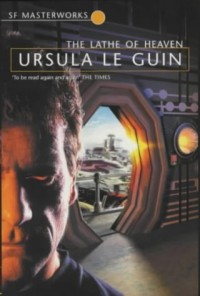He could almost feel his psychosoma being buoyed up

The Lathe of Heaven
by Ursula le Guin
Le Guin is one of the big names in modern science fiction and I had been meaning to read her for years, so I was glad to persuade my book club to join me in the adventure. Sadly, it turned out to be one of my less successful ventures into the genre, or at least a mixed result.
I loved the idea and the story built around it, and the opening chapter was for me quite attention-grabbing. George Orr is strung out on drugs in a version of Portland, Oregon that is suffering from runaway global warming, overpopulation and intense policing. As such he soon catches the attention of the authorities, who refer him to drug rehab in the form of the psychiatrist Dr Haber. Here we learn that Orr had been taking drugs to stop himself from sleeping, because when he dreams, his dreams change the world around him. Haber is initially sceptical but quickly discovers that it’s not only true, but that he can use hypnosis to influence Orr’s dreams. So begins the tug of war between the two men, fighting for control of Orr’s power.
“Current-borne, wave-flung, tugged hugely by the whole might of the ocean, the jellyfish drifts in the tidal abyss. The light shines through it, and dark enters it…Hanging, swaying, pulsing, the most vulnerable and insubstantial creature, it has for its defence the violence and power of the whole ocean.”
It really is a wonderfully original premise that remained original and fascinating throughout. At its heart it’s such a simple idea, but one with almost infinite possibilities, so I was glad that Le Guin kept the story focused quite narrowly on Orr. She does throw in a romance, but it’s done well, sans cheese and gives Orr another facet to consider when making major world-changing decisions.
But I must admit, for all that the idea and the story and even the details of the story thrilled me, I was not hugely impressed by the prose. I found it a little workmanlike, with sometimes wooden dialogue. Perhaps partly I was noticing aspects of the book that haven’t dated well. For instance, there’s a whole storyline revolving around skin colour that was clearly well intentioned and potentially fascinating, but the language used was so old-fashioned it made me cringe.
“Damn the stupid little bastard! He had got out of control. Haber cocked his head and maintained a tolerant, noninterfering silence; it was all he could do…
‘You said you remembered the Plague; but don’t you also remember that there wasn’t any Plague, that nobody died of pollutant cancer, that the population just kept on getting bigger and bigger? No? You don’t remember that?’
…Orr was quite white; the cheekbones stood out in his face. He sat staring up at Haber. He said nothing.”
I also struggled a little with the character of Orr. He’s so very passive, even when he tries to take control. Of course, he had to be a bit wet for the whole story to work, but it certainly makes him difficult to engage with.
However, there were elements I loved about this book. There’s a fantastic (and surreal) sense of humour that nicely balances out the more serious parts. And I like that Dr Haber is almost inscrutable, certainly neither wholly good nor wholly bad. He’s like a parable of a politician, telling himself he has the best of intentions, but in reality with all that power at his fingertips if he can just keep Orr in line… It really is a very interesting dynamic between the two men.
“After a week’s solid rain, barometric pressure was up and the sun was out again, above the river mist. Well aware from a thousand EEG readings of the link between the pressure of the atmosphere and the heaviness of the mind, he could almost feel his psychosoma being buoyed up by that bright, drying wind. Have to keep that up, keep the climate improving, he thought rapidly, almost surreptitiously.”
I have for a long time linked Ursula le Guin with Margaret Atwood because they are female North American writers of a similar age who have included a lot of SF in their back catalogues and are also friends and have discussed Big Ideas together publicly. So I suppose I expected Atwood-style prose. Instead I got an idea that was, I’d suggest, far more impressive than the basis of any Atwood book I have read, but without the mastery of language to make the most of it.
I will certainly try Le Guin again – at the very least the others of her titles included in the SF Masterworks series along with this one – but I am not yet convinced.
First published in Amazing Stories Magazine in 1971.
Source: Borrowed from Tim (who hasn’t actually read this yet, so I will have to get him to read it and have another mini book club about it!)
Y’know, reading your review, it sounds very familiar. I think I read it, but about a decade ago.
Tim Mini book club! Mini book club!